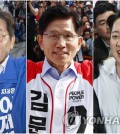- California Assembly OKs highest minimum wage in nation
- S. Korea unveils first graphic cigarette warnings
- US joins with South Korea, Japan in bid to deter North Korea
- LPGA golfer Chun In-gee finally back in action
- S. Korea won’t be top seed in final World Cup qualification round
- US men’s soccer misses 2nd straight Olympics
- US back on track in qualifying with 4-0 win over Guatemala
- High-intensity workout injuries spawn cottage industry
- CDC expands range of Zika mosquitoes into parts of Northeast
- Who knew? ‘The Walking Dead’ is helping families connect
S Korea, China split over level of sanctions on N. Korea

Yoon Soon-ku, right, director-general at the Ministry of National Defense’s international policy division, shakes hands with Chinese defense ministry’s Foreign Affairs Office Director Rear-Adm. Guan Youfei during working-level defense talks between the two countries in Yongsan-gu, Seoul, Friday. (Yonhap)
SEOUL/BEIJING (Yonhap) — China is opposed to a set of tougher sanctions on North Korea proposed by South Korea, the U.S., and Japan, a diplomatic source said Friday after key direct consultations between Seoul and Beijing.
Hwang Joon-kook, South Korea’s chief nuclear envoy, held talks with his Chinese counterpart Wu Dawei in Beijing a day earlier. It was their first face-to-face meeting between them since the North’s nuclear test on Jan. 6.
The two sides agreed to seek a “clear and certain” response to the North’s provocation, Hwang told reporters.
It strongly suggested that Beijing is against pushing Pyongyang too hard amid efforts by Seoul, Washington and Tokyo for “strong and comprehensive” sanctions.
Hwang pointed out the format of the U.N. Security Council’s punitive step has been already set. The 15-member council agreed to adopt a resolution.
Its contents are a sticking point and it remains uncertain how quickly a resolution will be produced. Hwang would not reveal details.
The diplomatic source later said there is a sort of draft resolution.
“It would take quite a lot of time for China to review the contents as those would affect many (Chinese) government agencies, not just the foreign ministry, as well as local authorities and private entities,” the source said. “China is doing quite a bit of homework. Frankly, there is a difference (between South Korea and China) on the level of sanctions (on the North).”
China believes excessive sanctions on the North will have a negative effect on dialogue efforts, added the source.
Earlier Friday, South Korea and China had working-level military talks in Seoul.
Rear. Adm. Guan Youfei, foreign affairs office director at China’s defense ministry, was quoted as reaffirming Beijing’s commitment to a new U.N. resolution against the North.
“China is absolutely against North Korea’s nuclear test,” he emphasized, according to a South Korean official.
Still, China will hold onto three principles — denuclearizing and keeping the peace on the Korean Peninsula and resolution through dialogue and negotiations — in resolving issues arising from North Korea’s recent nuclear detonation, Youfei added.
In Beijing, China’s foreign ministry spokesman Hong Lei told reporters that a new U.N. resolution must focus on safeguarding stability in the region.
“The Chinese side supports reactions from the U.N. Security Council on North Korea’s latest nuclear test,” Hong said. “The relevant resolution should focus on realizing the denuclearization of the Korean Peninsula, preventing nuclear proliferation and safeguarding peace and stability in Northeast Asia.”
















